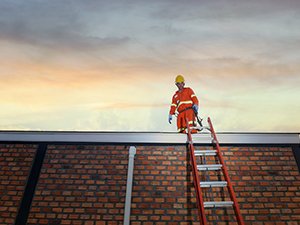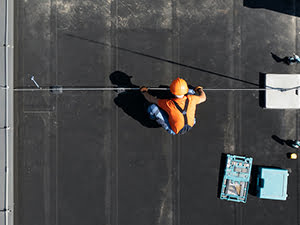
Regular commercial roof inspection services are the cornerstone of effective commercial building maintenance. Detecting potential issues early can save businesses thousands in repairs and prevent catastrophic roof failures that disrupt operations.
Protecting your Bismarck, ND commercial investment is the foundation of our business philosophy at Eagle Eye Roofing Systems. To learn more ways to enhance your roof longevity and performance, call 701-202-7280 today and speak with an expert.
Commercial Roof Inspection Matters
Here’s why professional inspections should be your first line of defense in roof maintenance.
Commercial roofs face constant exposure to harsh elements—UV radiation, temperature fluctuations, heavy rainfall, and wind. These environmental stressors accelerate deterioration, particularly in flat or low-slope commercial roofing systems common protecting warehouses, retail centers, and office buildings.
Studies show that commercial roofs inspected twice yearly last 8-10 years longer than those inspected only during emergencies. This preventative approach delivers substantial ROI, with inspection costs averaging just 3-5% of premature replacement expenses.
Key Components of a Professional Roof Inspection
A comprehensive commercial roof inspection includes:
- Membrane examination – Identifying cracks, blisters, or punctures in EPDM, TPO, or modified bitumen surfaces.
- Seam and flashing assessment – Checking critical junctures where water infiltration typically begins.
- Drainage evaluation – Ensuring proper water flow through gutters, scuppers, and internal drainage systems.
- Structural review – Verifying deck integrity and examining supporting components for signs of stress.
- Interior inspection – Looking for water stains, mold, or other indicators of leakage inside the building.
Warning Signs Requiring Immediate Attention
Professional inspectors are trained to identify subtle indicators of impending roof failure:
- Pooling water remaining 48+ hours after rainfall
- Membrane shrinkage pulling away from parapets or equipment curbs
- Bubbling or separation in roof layers
- Rusting metal components or fasteners
- Increasing energy costs are potentially linked to compromised insulation

Establishing an Inspection Schedule
Industry experts recommend commercial roof inspections:
- Biannually (spring and fall)
- After severe weather events (hailstorms, hurricanes, heavy snowfall)
- Following any mechanical system installation or maintenance
- When purchasing a commercial property
The Cost of Delayed Maintenance
Postponing your commercial roof inspection may ultimately prove expensive. Small issues rapidly escalate—a minor puncture becomes a saturated insulation system, which leads to deck deterioration, and eventually results in interior damage and potential business interruption.
Comprehensive Commercial Roof Inspection
A proactive inspection program transforms roof maintenance from reactive emergency management to strategic asset protection. By identifying issues at their earliest stages, building owners maintain control over repair timing and budgeting while maximizing their roofing investment’s lifespan.
Remember: your commercial roof isn’t just overhead protection—it’s a significant capital investment requiring regular professional attention to perform as designed. Call the experts at Eagle Eye Roofing Systems, 701-202-7280, to schedule your Bismarck, ND commercial roof inspection.
Commercial Roof Inspection FAQs
Can I perform inspections myself instead of hiring professionals?
While visual checks by maintenance staff are valuable, they don’t replace comprehensive professional inspections that utilize specialized equipment and trained expertise.
What credentials should I look for in a roof inspector?
Seek inspectors certified by organizations like NRCA (National Roofing Contractors Association) or IIBEC (International Institute of Building Enclosure Consultants) with specific commercial roofing experience.
Will my insurance cover inspection costs?
Many commercial property insurance policies don’t cover routine inspections, but documented maintenance may reduce premiums and strengthen claims when damage occurs.
How detailed should inspection reports be?
Expect comprehensive documentation including photographs, condition ratings, identified issues, recommended repairs with prioritization, and estimated remaining service life.
